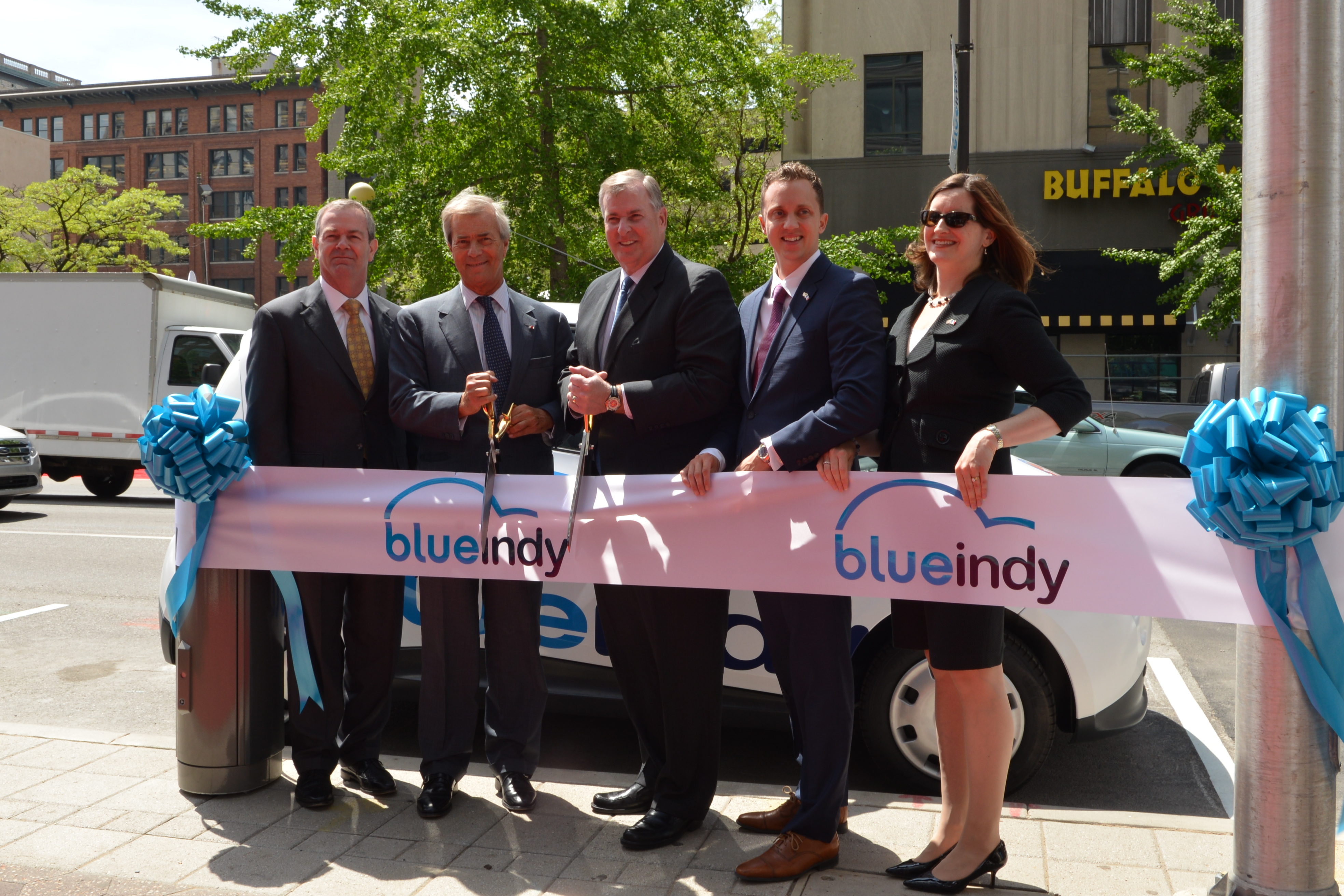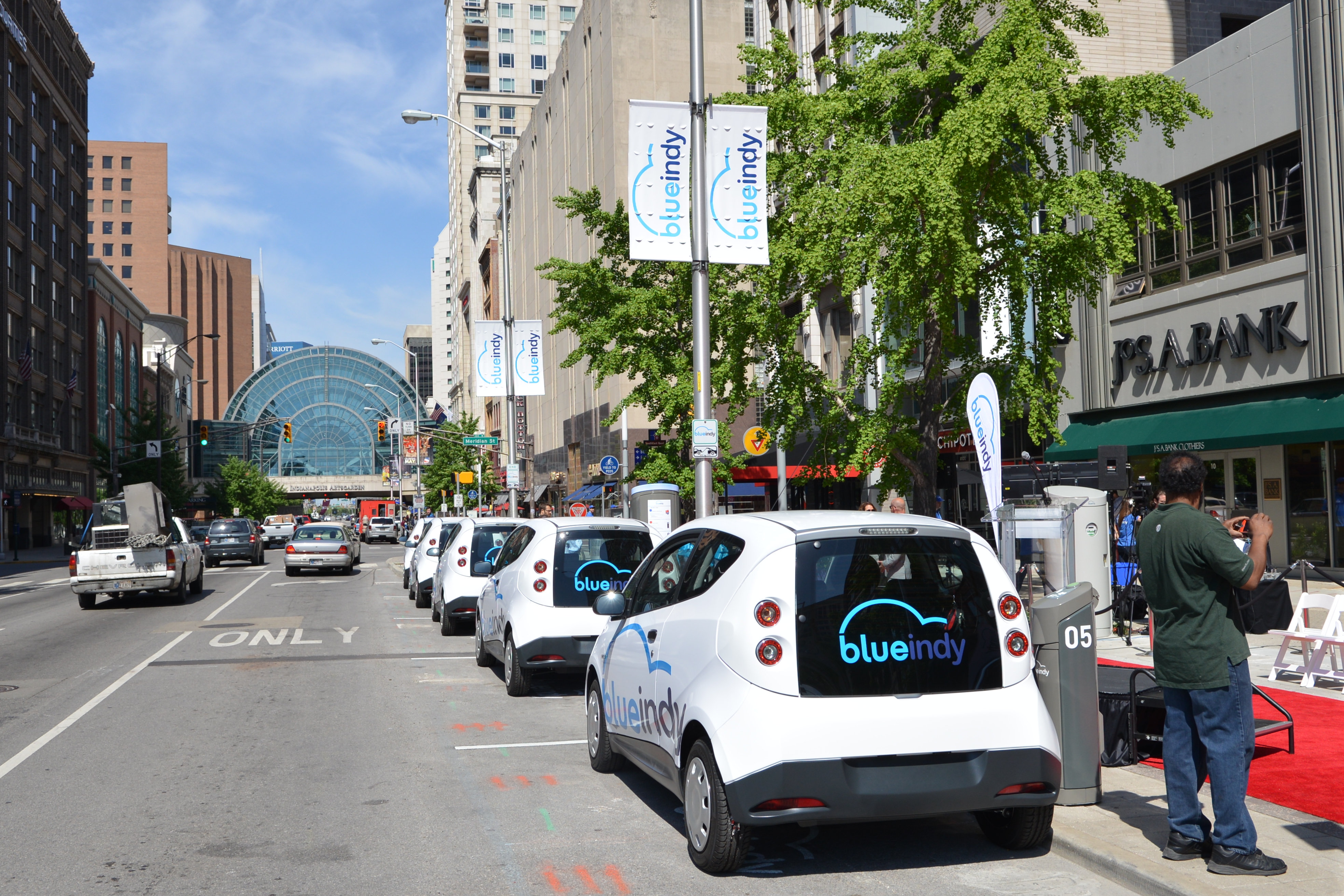Connecting state and local government leaders
Chicago, Indianapolis move beyond the traditional municipal vehicle fleet model.
Government vehicle fleets often make headlines for all the wrong reasons. In 2012, a South Florida Spanish-language news outlet made an odd discovery in a parking garage: Nearly 300 barely-driven Toyota Prius hybrids that had been brought new by Miami-Dade County in 2006 and 2007 and were somehow forgotten.
More recently, New Jersey Transit disciplined 10 employees this spring for misusing agency vehicles after GPS devices were installed as part of an effort to track vehicle usage and eliminate fraud and abuse. In that case, the agency fired three employees and suspended one for 30 days, according to The Record newspaper.
More and more, local governments and agencies are looking to ditch their resource-heavy and costly traditional car fleets for their employees and turning to new models.
“It’s such an archaic concept,” said Charles Stephens, Zipcar’s general manager for Chicago operations, where the car-sharing service has contracts not just with the city of Chicago, but the Illinois Department of Central Management Services, Cook County, the Chicago Public Schools, the Chicago Parks District, the Chicago Transit Authority and a handful of suburbs.
“Some of these cities have hundreds or thousands of vehicles that they may not actually need,” Stephens said. With car-sharing, “the dollars saved are so compelling.”
Boston-based Zipcar, which merged with a leading competitor in 2008, continues to dominate the car-sharing market in the United States. Beyond its standard memberships, Zipcar’s offerings for local governments fall under two general programs. In the first, local governments can purchase discounted memberships for their employees to use Zipcar’s existing fleet of vehicles at reduced hourly rates. In the second, known as FastFleet, Zipcar technology is installed in a local government’s fleet to track usage, manage booking and other logistical tasks.
Zipcar kicked off car-fleet operations with the city of Chicago in January 2011 using a combination of the two approaches.
Michael Serafino, Zipcar’s vice president of sales and market development, said it made sense for Chicago to partner with the company since the car-sharing service was already popular with local residents in nation’s third-largest city. “This is the government modeling citizen behavior,” Serafino said.
It was a fairly easy implementation for both parties. “There was no delay,” Stephens said. “They were immediately wired in.”
Chicago has 98 city-owned vehicles managed through Zipcar’s FastFleet program, which is branded locally as Flex Fleet. More than 800 city employees have signed up to use the shared fleet. About 400 city employees have signed up for Zipcar memberships, where cars scattered across the city are shared with regular Zipcar members.
Kevin Campbell, manager of fleet services for the city, said employees who need cars on a short trips during the work week are encouraged to use Zipcar, while those who have out-of-town business or need a car for a longer period are pushed in the direction of Flex Fleet.
“That seems to be a more cost-effective way to do it for us,” he said.
Chicago has seen its overall fleet decrease in size from 1,000 cars before the program’s implementation to about 650 vehicles now. The program also has reduced the need to pay for parking downtown, which previously cost the city roughly $200 per month per vehicle, Campbell said.
The Zipcar/Flex Fleet program is 25 cents per mile cheaper for the city compared to the city-managed fleet, he said.
When Chicago’s leased vehicles -- which are managed separately from the Zipcar arrangement -- are factored in, the reduction of the motor pool through car sharing has yielded roughly $7 million in savings since the program started in January 2011.
“Our total expenditure on Zipcar has been $500,000,” Campbell said. “It's been an incredible return on investment."
WATCH: How Chicago government embraced car sharing
More than three years after implementation, Campbell said, “there’s been a little bit of a learning curve" with Flex Fleet because people have to reserve cars that are shared by employees from 25 departments. "Some departments were reluctant to give up their pods of vehicles. ... But for the most part, it’s part of the culture now.”
There’s also the oversight factor. With Zipcar’s tracking technology deployed in the vehicle fleet, it’s considerably more difficult for employees to abuse their car privileges -- and for departments to say they don’t know who is responsible for parking tickets and traffic infractions.
“There’s more accountability involved,” Campbell said. “For those who were abusing the program before and kind of getting away with it, they had some issues” with the implementation of car-sharing.
Although Zipcar, which also has vehicle fleet contracts in major jurisdictions such as New York City, Washington, D.C., and Houston, is the major player in the market, there’s a new car-sharing model taking root in Indianapolis.

Indianapolis Mayor Gregory Ballard, center, seen here at the ribbon cutting to launch BlueIndy in May, wants his city's vehicle fleet to transition off foreign oil sources. (Photo courtesy BlueIndy)
It all started with a bold executive order signed by Mayor Gregory Ballard in December 2012: The Marine Corps veteran wanted the city’s non-police vehicle fleet to wean itself off foreign oil by 2025 and transition to all-electric plug-in vehicles. That got the attention of France’s Bolloré Group, which operates Autolib, an all-electric car-sharing fleet in Paris.
“We got on their short list of cities” for electric vehicle car-sharing expansion, said David Rosenbaum, the mayor’s director of enterprise development. “We were able to show them why it’d work here.” The result was BlueIndy, which kicked off its car-sharing demonstration project in May.
Indianapolis is now on its way to building North America’s first all-electric car-sharing service. The $35 million investment will create 100 local jobs as the system expands to 500 vehicles, with 1,000 charging stations at 200 locations around the city, Rosenbaum said. Twenty-five car-share locations should be up and running by the end of the year.
Local electric vehicle owners can also also pay to use BlueIndy’s car-charging stations.
As in Chicago, Indianapolis city employees with short-term vehicle needs will share the fleet with public car-share members.
The system will eliminate the need for city employees to travel to an off-site location to get a city-owned car, since BlueIndy vehicles will be stationed at strategic spots around the city. “It gives employees more options,” Rosenbaum said.
Ballard, a Republican, has been promoting the BlueIndy program with fellow mayors across the country and in May signed an agreement with Kevin Johnson, Sacramento’s Democratic mayor, to work together to reduce their respective cities’ dependence on foreign oil.
“It shows that this isn’t a partisan issue,” Rosenbaum said.
He predicted that BlueIndy will become particularly popular downtown, which is frequented by 40,000 college students and 2 million annual conventioneers. Local companies have also expressed interest in joining the program.
“There will be true savings,” Rosenbaum said — $6,000 to $8,000 per car over the lifespan of a fleet of 450 sedans. “It’s a really good investment for the city and it fits really well within [Ballard’s] goal to remove the municipal fleet from foreign oil,” he said.

BlueIndy electric car-sharing vehicles are positioned on a downtown Indianapolis street. (Photo courtesy BlueIndy)
Photo of a Chicago Flex Fleet vehicle by Flickr user Daniel X. O'Neill via a Creative Commons 2.0 Generic License.




